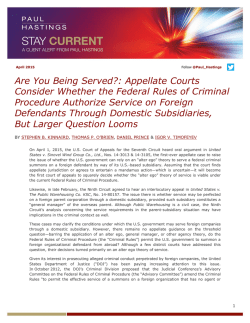
Newsletter from the National Criminal Justice Board
CRIMINAL JUSTICE BULLETIN WORKING IN PARTNERSHIP FOR A MODERN CJS A bi-monthly newsletter for criminal justice partners Issue 5 / 12 September 2014 MESSAGE FROM CRIMINAL JUSTICE BOARD CONTENTS I am pleased to have this opportunity to raise awareness on the work of the police and my role as the national policing lead for criminal justice. I lead on development on policing practice and professionalism in criminal justice matters on behalf of all forces. The role of the police is far wider than bringing offenders to justice and involves difficult and challenging decisions across the UK. Forces are also responsible for the monitoring of some offenders on their release from custody as well as liaising with police worldwide in pursuit of international criminals. p.1 – Message from Board; Chris Eyre (Chief Constable Nottinghamshire Police) p.2 – Cross-agency activity p.3 – Local Perspectives p.4 – Notices p.4 – Request for Help Annex A – PCC’s prisoner rehabilitation project Annex B – Forward plan of key dates Each criminal justice agency understands the tremendous challenges ahead to provide a system to all that is consistent across all police, court and CPS areas and is resilient to future developments. The government has developed a Strategy and Action Plan to ensure that the criminal justice system is lean, modern and responsive in an era of significant austerity and enormous change. The police are actively delivering a number of work streams or central pillars which taken together will enable us to deliver our elements of the Action Plan. My business area develops national best practice with the College of Policing and has specific portfolios that respond to issues across the following areas: There are many enablers to support the Action Plan which include the development of digitisation across policing, such as body-worn video, court video systems and app-based products to capture evidence at the earliest opportunity, and a digital process in which to deliver case files to the CPS and the court room. The digitisation and simplification of the criminal justice system will also ensure that scarce police resources can be used more effectively for the benefit of victims and communities. Victims and witnesses are at the heart of the criminal justice system and will receive better support and information through the use of modern technologies and proposals to make processes more efficient such as police-led prosecution of simple and uncontested matters in the magistrates’ courts and case management initiatives led by the judiciary. I am currently working with partners in the CPS, HMCTS and the judiciary to reform the criminal justice system through four distinct initiatives; Transforming of Summary Justice (TSJ), the magistrates’ Summary Disclosure Review (SDR), File Quality, and the Early Guilty Plea scheme (EGP). Enforcement Charging and Out-of-Court Disposals Custody and Movement of Prisoners Integrated Offender Management Bail Management Victims and Witnesses File Quality and Performance Foreign National Offenders & Prisoners Extradition & Mutual Legal Assistance Interpreters and Language Services Virtual Courts and Integrated Prosecution Community and Restorative Justice Digital Evidence Programme Board Criminal Procedure & Investigations Act Disclosure I maintain oversight of each portfolio which in turn has an individual ACPO lead. I also report on the progress of each portfolio to the Chief Constables Council and the Criminal Justice Board which is chaired by the Minister of State for Policing. Chris Eyre QPM - National Policing CJS Lead (and Chief Constable, Nottinghamshire Police) 1 CROSS-AGENCY ACTIVITY LCJB/P & PCC Conference – 21 October 2014 Victims and Witnesses Questions for the CJB A one-day conference for LCJB/Ps and PCCs is being held on Tuesday 21 October 2014 at the Ministry of Justice (MoJ) HQ in London, 10.00am to 4.00pm. The aim is to provide local and national CJS colleagues with an opportunity to engage in a range of topics, including presentations on key areas of CJS reform such as Digital Reform, Transforming Rehabilitation, Restorative Justice and Transforming Summary Justice. There will be opportunities to engage directly with CJB members and senior policy leads, information stalls on a variety of subjects such as the CJS online community, hate crime, TrackMyCrime and NHS England's Liaison and Diversion Programme. LCJB/Ps are reminded that in the last edition, LCJB/Ps were asked to submit questions to the CJB for a Q&A session, which is scheduled to take place at the end of the day. Questions need to be sent to [email protected] by 26 September fro inclusion in that session. Neighbourhood Justice Panels The Ministry of Justice (MoJ) has been working with 15 areas to test Neighbourhood Justice Panels (NJPs) over the last two years. NJP meetings bring local victims and offenders together before a panel facilitated by local volunteers, to deal with incidents of low level crime and antisocial behaviour, including neighbourhood disputes, noise nuisance and littering. The test period has now concluded and, in response to the recommendation in the Process evaluation of the NJP, MoJ supported the NJP test areas to cascade lessons learned through a series of workshops. Thank you to those who attended the workshops. If you were unable to attend but are still interested in the lessons learned, a User Guide to NJPs (available from our online community) was developed by local practitioners to share their experience and learning on implementation of NJPs. It also contains a set of principles, practical implementation tips and frequently asked questions. The guide is aimed at assisting practitioners to establish local NJPs or review existing schemes, and may assist practitioners responsible for commissioning restorative justice practices in their area. For queries contact [email protected]. LCJB/P Stalls Around the country many LCJB/Ps have identified and implemented local initiatives to improve their services. The conference is an ideal opportunity to share and promote those initiatives with cross agency colleagues and LCJB/Ps are invited to host a stall at the conference. If your LCJB/P would like to take up this offer, please contact [email protected]. CPS makes service to victims and witnesses an organisational priority The Crown Prosecution Service now has dedicated Victim Liaison Units (VLUs) in place for every area across England and Wales. VLUs are responsible for Direct Communication with Victims (DCV), the Victims’ Right to Review scheme, complaints, and for overseeing the service to bereaved families. Under the new scheme, DCV communications to victims provide a clear and concise explanation of decisions, but also invite victims to contact the VLU if they would like more details. VLU staff follow a tailored training programme including sessions from Victim Support, and on communicating with victims and witnesses.In addition, between September and December this year, CPS will conduct a telephone and online survey with 10,000 people who came forward with a victim or witness statement in the last year. The ten-minute questionnaire covers the perceived quality and timeliness of the service they received, and how satisfied they were with their interaction with the CPS. The results will be analysed in the new year. For more information contact [email protected]. Serious Organised Crime Strategy On 14 July, Chief Constable of Durham Constabulary Mike Barton co-hosted the last in a series of regional workshops to promote the Serious and Organised Crime Strategy and local multi-agency working. Over 800 representatives from agencies including local authorities, PCCs, prison and charities participated in the workshops. Themes emerging from the workshop include agreement that “local conditions should dictate local response”, strong support for local profiles of serious and organised crime and a powers toolkit that can be shared widely. There is a clear preference for using existing structures such as Community Safety Partnerships. Local partners have also requested guidance from government on roles and responsibilities in tackling cyber crime and support to encourage better information sharing between local partners. A detailed programme of work that addresses these and other local delivery issues in the Serious and Organised Crime Strategy is being finalised, including publication of guidance on the production of local profiles. If you would like further details about this work please contact [email protected]. 2 CJS Equality and Diversity been identified (criminal legal aid and going to court) and explore what further opportunities there are to simplify some of the language frequently used in the CJS. The group also worked closely with experts from within and outside the CJS to advice on wording/content, language and format. Draft initial versions of parts of the guidance were produced at the end of August 2014 and a testing and editing phase will begin in September/October 2014. Publication is expected by January 2015. For more information please contact [email protected] At the November 2013 CJS Equality event on disabilities, representatives suggested that the Ministry should develop ‘Easy Read’ versions of guidance to make the CJS easier to understand. The Criminal Justice Board agreed that this should be progressed and published a commitment in July 2014 in the Implementation Update to the Strategy and Action Plan. A working group was established in May 2014 comprising key CJS partners to oversee and support the development of Easy Read guidance where gaps have LOCAL PERSPECTIVES Derbyshire Community Safety Unit commissioned ‘The Art of Brilliance’, workshop, to be delivered to lookedafter children in identified areas, and nineteen secondary schools across the region. The workshops aim to inspire young people to focus on pro-social thinking habits, attitudes and behaviours. The workshops use positive psychology techniques to help young people cope with peer pressure which can influence their decisions in a negative way. Pupils learn how to take responsibility for their own behaviour, understand how it affects people around them, learn to set goals and build selfconfidence. The Art of Brilliance was delivered in nine schools and with looked after children in identified hot spot areas This was successful resulting the Art of Brilliance being commissioned to deliver to a further ten schools. Derbyshire Councillor Dave Allen said: “We know that low self-esteem often leads children to risk their own welfare with negative behaviour such as underage drinking and even crime. This has a knock-on effect for entire communities, which is why this kind of intervention work benefits everyone.” The Chairpersons of the panel and practitioner groups report frequently to the LSCB on progress, success and challenges. The effectiveness and impact of the work is qualitatively evaluated and demonstrates that it delivers a low cost in-house service with high benefits to vulnerable young people. For more information contact [email protected]. A unique partnership between the Probation Service and South Wales-based domestic abuse charity Atal y Fro (formerly Vale of Glamorgan Women’s Aid) has received an award from the Howard League for Penal Reform. The charity helps women seeking to break away from the cycle of domestic violence, provides counselling for children, and recognises that women too can sometimes be the violent partner in a relationship. It supports couples who wish to stay together safely or separate amicably. With the help of Wales Community Rehabilitation Company, Atal y Fro has been providing innovative, specialist programmes to help men tackle violent behaviour in a safe, supportive environment. Men convicted of domestic violence can reduce their risk of reoffending by taking part in an Integrated Domestic Abuse Programme (IDAP), which consists of weekly group sessions lasting for nine months. Attendees are encouraged to take responsibility for their behaviour and take positive steps towards changing it. A less structured, four-month programme is also available, providing a safe environment for men to discuss their issues. A number of men have graduated from the IDAP and gone on to become mentors for the group. Contact [email protected] for further information. North Lincolnshire’s multi-agency Harmful Sexual Behaviour (HSB) project was chosen as overall winner in the Community Sentences: Young People category at The Howard League for Penal Reform Community Programme Awards 2014. The HSB project consists of a multi-agency team that manages all cases of HSB involving young people aged 10 and over. It also consists of a panel of senior managers from a range of organisations and a practitioner group of HSB-trained professionals. The panel coordinates the approach from identification through to review, whilst practitioners work together undertaking AIMs assessments and interventions based upon the Good Lives model. Fasttrack assessments are delivered in tandem with statutory plans focusing on the young person primarily as a Childin-Need. Training on Local Safeguarding Children Board (LSCB) is made available for key partner agencies. 3 West Mercia Police and Crime Commissioner (PCC) Bill Longmore has begun creating a prison-based manufacturing and sales project. Offenders will have the opportunity to develop and enhance their employability and life skills by producing items that will be marketed and sold externally. All profit will be reinvested back into the three custodial centres in West Mercia. Paul West, recipient of the Queen’s Police Medal and former Chief Constable of West Mercia police, has written an article about the project which is available at Annex A. Thames Valley LCJB has been supporting a domestic abuse initiative in Buckinghamshire since January 2014. The initiative resulted in fast-tracking domestic abuse trials which are listed within two/three weeks of plea. Police have been providing initial disclosure in all cases with CPS reviewing prior to first hearing. Magistrates are adopting a firm approach to case management to ensure that trials are effective. Witness Services advise that they have to provide less support for victims as trials are listed earlier and have provided positive feedback from victims that the case has been concluded quickly and effectively. The initiative is being extended across the Thames Valley at the end of the year. For more information about the scheme, contact [email protected]. NOTICES Transforming Rehabilitation: Following the PCC Competed Fund: The Ministry of Justice successful stand up of the National Probation Service and Community Rehabilitation Companies on 1 June, the transition period has progressed well. The Ministry's TR programme is continuing to support staff to embed the new structures and monitoring any impact from the reforms on the wider CJS. After the first stage of evaluation, there is healthy competition in all of the 21 Contract Package Areas with over 80 bids representing small and large businesses, employee mutuals formed by probation staff and third sector providers. The Programme is entering into detailed discussions with bidders and remains on course to award contracts by the end of this year. More information is available at [email protected]. announced the results of the PCC Competed Fund 2014/15 at the beginning of July 2014. Additional funding of £12.5m has been awarded to successful PCCs to help support priority victims of crime to cope and recover. For more details about the projects being funded, please click here. Contact [email protected] for information. An updated forward look of key dates useful to LCJB/P local planning and delivery can be found at Annex B. REQUEST FOR HELP CJS Partnership Communications: Cross CJS colleagues are developing a strategy to increase membership and usage of the online community “Local Criminal Justice Partnerships”. The aims are to turn it into the foremost channel of communication between local partnerships and with national agencies and improve cross agency communications and collaboration on CJS reform projects. In line with open policy making across government and enabling a digital CJS, the CJS Local Partnerships team will be seeking to identify what local and national, cross agency colleagues want from their online community. The long-term goal is for open and frank discussions to be driven by LCJB/Ps and other community members. As part of the consultation, the CJS Local Partnerships team would also like views on potentially using the online community as an alternative to the function of “the distribution list” that LCJB/P Business and Performance managers currently use. Please fill in the attached survey or email us with your views at [email protected]. The CJS Local Partnerships team will be hosting a market stall at the forthcoming LCJB/P & PCC Conference which will provide delegates with further opportunities to contribute views on their expectations of an online community. Please encourage your colleagues to sign up to the online community to participate in this discussion and future ones. Contact [email protected] for further information. 4 The Criminal Justice Bulletin is a bi-monthly publication. The next edition will be published week commencing 3 November and a commissioning email and template for contributions will distributed in advance. If you would like to share thoughts on the Criminal Justice Bulletin, please email the editor at: [email protected] Working together to: reduce crime and re-offending, protect the public, punish offenders, provide reparation, be fair and just, increase public confidence 5 Annex A PCC’s self-funded skills development and prisoner rehabilitation project by Paul West QPM When the Coalition Government created the title Police ‘and Crime’ Commissioners, it intended to convey a broader scope for their remit than just policing. That is why it is refreshing to see some PCCs actively seeking to embrace the wider aspects of their role through innovative long terms crime reduction schemes. A case in point is in my former force area, West Mercia, where a prison-based project, now in its infancy, bears testimony to the creative thinking of PCC Bill Longmore. Bill’s long-held belief is in the value of working with offenders to help them develop new skills so they have an alternative to a life of crime. There are three men’s custodial establishments in the West Mercia force area: a maximum security Category ‘A’ prison; a multiple security Category ‘B’ to ‘D’ prison; and a young offenders’ institution. In visiting all three establishments as part of his programme of induction visits, Bill discovered that the government’s austerity programme has brought about a reduction in the number of training opportunities for prisoners and that most of the facilities were vastly under-used. He quickly identified this as a lost opportunity. A very productive meeting with the three Deputy Governors followed. Since then, Bill’s project board has met on two occasions. All parts of the prison estate in West Mercia, including at the Governor level, are enthusiastic about Bill’s vision for a prison to fund its own skills development, manufacturing and sales operation. The business model that he proposes involves achieving external sales of a range of products manufactured in the three custodial centres, with all profits being re-invested in the prisons to fund equipment and staff for further skills-based training programmes. The independent not-for-profit company will initially be run by a volunteer Board of Executives and Non-Executives with appropriate business, manufacturing and marketing skills and experience. Bill’s next step is to identify carefully selected partner suppliers and sales outlets, and agree with them a broad range of manufacturing lines. Care will be taken to ensure that the project does not unfairly compete with non-prison based manufacturing companies already trading in the same or similar marketplaces. Building on the primary aim to make better use of existing prison manufacturing facilities, an additional aim could be to identify prisoners who have skills that are currently not catered for - artistic ability, for example. These prisoners could then be provided with the necessary equipment and materials to produce high quality items for external sale and to provide tuition and mentoring for fellow detainees who wish to develop similar skills. He also sees the project as having deeper benefits. “This initiative isn’t all about prisoner rehabilitation and re-integration into the world of work. It’s just as much to do with developing a sense of achievement and self-worth amongst the long-term and lifer prisoner community, many of whom feel complete worthlessness and a sense of detachment from the world outside the prison walls.” Bill plans for the project to be fully established and sufficiently mainstreamed to continue operating well beyond the end of his term in office, irrespective of who is elected as West Mercia’s Police and Crime Commissioner in May 2016. Paul West QPM is the former Chief Constable of West Mercia Police 2003-2011. He now runs Policing First, an ethically-based company with a unique business model, involved in UK and international policing development and supporting a range of community-based educational, healthcare, skills development and community safety projects and charities. 6 Annex B Forward look table of key dates useful to LCJB/P Planning & Delivery (2014/15) Date Description Impact and/or action required from LCJB/Ps SEPTEMBER w/c 8 September Publication of September edition of Criminal Justice Bulletin with its supplementary newsletter Criminal Justice Reform w/c 15 September Announcement will be made about the location of 2 Female No action. Further information available at: Rape Support Centres which will meet the Coalition [email protected] Commitment to establish 15 new centres by March 2015. LCJB/Ps to distribute to board members and wider CJS colleagues and encourage them to sign up to online community “Local Criminal Justice Partnerships". Announcement will also be made about the training No action. Further information available at: company who will deliver training to 200 Independent [email protected] Sexual Violence Advisor about the court processes in the criminal courts between December 2014 and March 2015 w/c 29 September Publication of MoJ consultation on The Role of Magistrates. No action, for interest/information only OCTOBER 1 October New nationally commissioned national Homicide Service to begin operating No action, for interest/information only First Monday of October Implementation of Criminal Procedure Rule amendments. No action, for interest/information only Details can be found at: http://www.justice.gov.uk/courts/procedure-rules/criminal 7 October LCJB/P Roadshow visit to London Criminal Justice Partnership by Jo Rowland, Head of CJS Efficiency Programme 9 October LCJB/P Roadshow visit to Bedfordshire and Hertfordshire Bedfordshire and Hertfordshire and and Cambridge LCJB/Ps by Peter Handcock, CJB Cambridgeshire LCJB/Ps to submit questions member. in advance. Await notification from CJS Local Partnerships Team. 17 October Deadline for article contributions to the November edition Submit your LCJB/P contribution via the of the Criminal Justice Bulletin submission form to [email protected] 21 October LCJB/P & PCC Conference, Ministry of Justice Headquarters (London) London LCJB/P to submit advanced questions. Await notification from CJS Local Partnerships Team. Act on various communication from CJS Local Partnerships Team. NOVEMBER w/c 3 November Publication of November edition of Criminal Justice Bulletin with its supplementary newsletter Criminal Justice Reform LCJB/Ps to distribute to board members and wider CJS colleagues and encourage them to sign up to online community “Local Criminal Justice Partnerships". 4 November LCJB/P Roadshow visit to Cleveland and Durham by Ben Durham and Cleveland LCJB/Ps to submit Connah, MoJ Deputy Director in Justice Reform questions in advance. Await notification from CJS Local Partnerships Team. 10 November LCJB/P Roadshow visit to Surrey and Sussex by Mary Calam, CJB member. Surrey and Sussex LCJB/Ps to submit questions in advance. Await notification from CJS Local Partnerships Team. 14 November LCJB/P Roadshow visit to the North West (Greater Manchester, Lancashire, Cumbria, Merseyside and Cheshire) by Peter Lewis, CJB member. LCJB/Ps hosting roadshow to submit questions in advance. Await notification from CJS Local Partnerships Team. 7 DECEMBER 2 December LCJB/P Roadshow visit to South West (Avon & Somerset, Gloucestershire and Devon & Cornwall). Name of CJB member/senior leader TBC 12 December LCJB/Ps hosting roadshow to submit questions in advance. Await notification from CJS Local Partnerships Team. Deadline for article contributions to the November edition Submit your LCJB/P contribution via the of the Criminal Justice Bulletin submission form to [email protected] JANUARY 2015 w/c 5 January Publication of January edition of Criminal Justice Bulletin with its supplementary newsletter Criminal Justice Reform LCJB/Ps to distribute to board members and wider CJS colleagues and encourage them to sign up to online community “Local Criminal Justice Partnerships". FEBURARY N/A N/A N/A MARCH 26 March LCJB/P Roadshow visit to Kent by the Rt. Hon. Steve Penning MP (Minister of state for Policing, Criminal Justice and Victims) and Antonia Romeo, CJB member. Kent LCJB/Ps hosting roadshow to submit questions in advance. Await notification from CJS Local Partnerships Team. APRIL First Monday of April Implementation of Criminal Procedure Rule amendments. No action, for interest/information only Details can be found at: http://www.justice.gov.uk/courts/procedure-rules/criminal 8
© Copyright 2026









